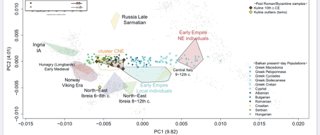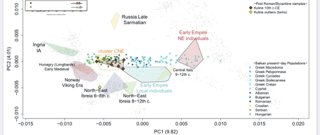Yetos
Regular Member
- Messages
- 5,959
- Reaction score
- 519
- Points
- 113
- Location
- Makedonia
- Ethnic group
- Makedonian original
- Y-DNA haplogroup
- G2a3a
- mtDNA haplogroup
- X2b
I�ll break it down for you: old neighbouring populations for thousands of years = genetically connected (fact) through intermarriages, internal migrations, and common shared ancestry (early farmers, indo-europeans, local Sardinian-like ancestry) -> New immigrants (Slavs) arrive = old populations are pushed South to the extreme bottom of the peninsula (Peloponnese) -> mountainous areas less affected by the Slavic influx remain genetically closer, whereas areas like Greek Macedonia and Thrace are shifted towards Bulgaria (locals + North-Eastern Europeans/Slavs + other populations like Anatolians or Armenians from Byzantine times).
The only thing I didn�t do is underestimate the Albanian scale of migration. Instead, it was you who underestimates the degree to which areas of Illyricum, Epirus, Macedonia, Thessaly, Aetolia, Paeonia, etc. were related, as shown by the affinity that 1 Bronze Age Macedonian sample had with modern Albanians, or even the Iron Age Thracian.
Thus, shared IBD and similar genetic makeup lead to Albanians and Peloponnesians being quite close.
On the other hand, if the Albanian migration scale was as extremely high as you suggest, Albanians and Peloponnesians would almost overlap, but we don�t.
Just remember that thecountryof Fier, Durres, etc were also Greekcolonists,
Fier (Φτερη) was colony of Peloponesians (korintheans)
Also Koryca was at Makedonian Kingdom
So some relations might be vice-versa.
Plz notice also this



